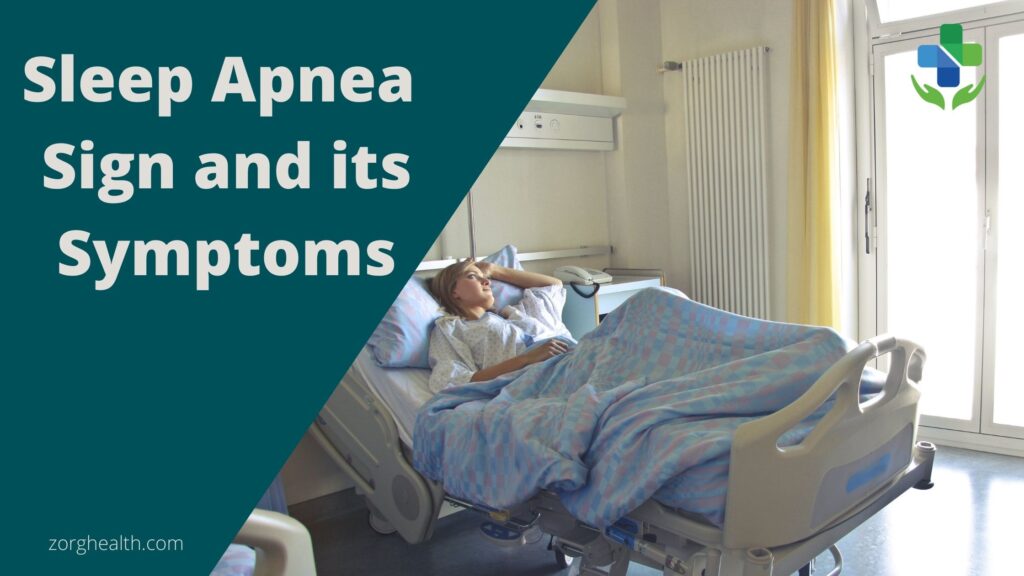A sound sleep is vitally important for everyone and at every age. Adequate body rest and sound sleep are not only important for work and play but also for physical and emotional well-being. In this article, we learn what are sleep Apnea causes and its Symptoms.

What sleep apnea causes TOC
What is Sleep Apnea?
Snoring is noisy breathing and it happens because of blockage or narrowing of the airway anywhere between the nostrils to the windpipe (trachea). Apnea means temporary stoppage or cessation of breathing. Sleep apnea also called obstructive sleep apnea (OSA) is a disorder of sleep where the patient has to get up in between sleep due to complete cessation of breathing and this can become a serious medical condition.
Sleep apnoea is more common than you think, it is not just found in adults but also in children or toddlers. If left untreated, it can lead to critical and chronic health disorders like diabetes and heart-related diseases. It can also significantly increase the chances of hypertension (high BP), stroke (blockage or bleeding in the blood vessels of the brain), heart attack, concentration problems, etc.
Snoring can lead to apnoea when there is an 80% reduction in airflow from a baseline for at least 10 seconds thus causing breathing disturbances.
With the unhealthy lifestyle, disturbed sleep patterns, and work-related stress the number of people living with chronic sleep apnea and respiratory disease is continuing to grow. And so do the challenges of caring for them.
What sleep apnea causes?
As already mentioned, snoring is due to air passing through narrowed air passages causing vibration of tissue, making a loud noise. Excessive blockage can sometimes lead to a complete cessation of breathing called sleep apnea. Here are the causes of snoring-
- Narrow or overcrowded oropharynx- oropharynx is the part of the throat behind your mouth. It includes the last part of your tongue, soft palate (backside of your palate and the hanging tissue “uvula”), tonsils, and sidewalls. So if you have bulky tongues or large tonsils that will reduce the space in the oropharynx making you prone to snoring.
-
Enlarged adenoids- just like you have tonsils on the back of the throat, there is similar tissue called adenoids in the backside of the nose (more commonly found in children) causing obstruction and snoring.
-
Nasal blockage- nasal congestion or deviated bones can also narrow down the air passage and cause turbulence.
-
Excessive tiredness- heavy or extra physical activities can make you tired and you may get deep nights of sleep, in which there is more relaxation of muscles leading to snoring.
-
Insomnia- disturbed sleep patterns can also lead to a sudden bout of daytime sleep causing snoring.
-
Alcohol consumption- frequent or excessive alcohol intake causes more bodily relaxation leading to snoring.
Apart from these causes, there are factors that make an individual more likely to have snoring, these are-
-
Males- men are more likely to be suffering from snoring than women.
-
Obesity- obese people have narrow air passages leading to snoring.
-
Deviated or enlarged nasal bones.
How do you know if you have Sleep Apnea?
Loud snoring with episodes of silence in between is sleep apnea. Sometimes individuals suffering from sleep apnoea need to gasp or wake up to forcefully open the airways. The majority of people might not know that they suffer from sleep apnea unless they have disturbed sleep or need to get up during sleep. Here are some known signs and symptoms of Sleep Apnea in adults-
- Snoring loudly frequently
- Breathing pauses (difficulty in breathing) while sleeping
- Sweating a lot while sleeping
- Waking up choked or coughing or gasping
- Waking up often to use the bathroom
- Waking up with a dry mouth or sore throat or headache or dizziness
- Having concentration or memory problems while awake
- Feeling fatigued or sleep or anxious frequently
- Experiencing frequent mood swings or irritation
- Sleeping at inappropriate times during the day
- Having tonsil or adenoid related health problems
- Having risk factors for sleep apnea (example, being overweight, use of alcohol or tobacco, and smoking)
- Experiencing sexual dysfunction or reduction in interest in sexual activities.
If you notice a number of the above-mentioned signs in you, then is a possibility you have sleep apnea. Consider consulting a doctor for the next step.
Sleep apnea can be dangerous as it can lead to accidents during work or commute. Also, it can make you more aggressive and frustrated.
Management of sleep apnoea
Your doctor will advise some tests like endoscopies of the nose and throat to see the site of narrowing or obstruction. To evaluate and grade the disease majority of patients undergo POLYSOMNOGRAPHY. Polysomnography requires you to be under observation overnight.
During your sleep different bodily activities are observed – EEG (electroencephalogram) measures brain waves and gives an idea about your sleep, EOM(electro-oculo-gram) measures activities of your eye muscles and their movement, ECG(electrocardiogram)measures activities of your heart, pulse oximetry measures how much oxygen is in there in blood, etc.
Depending upon the cause your doctor may advise you on weight loss, nasal drops for decongestion, positional sleeping, surgery, or respiratory care (sleep therapy).
Nowadays sleep therapy systems are designed with the needs of care practitioners and patients in mind. These systems provide exceptional therapy, enhanced patient comfort, and essential compliance tools which are important in today’s challenging environment. This is done with the help of pressure devices like CPAP(continuous positive airway pressure) or BiPAP (bilevel positive airway pressure), which help to keep the airway open.
The respiratory care management system assists to make better, more informed clinical decisions at providers’ fingertips. Other benefits are-
- Connects homecare providers, physicians, and payers with patients across the entire health continuum.
- Delivers actionable patient information directly to care teams via smartphone, tablet, or PC, so everyone can work together to make fast, informed clinical decisions.
- Makes it possible to remotely monitor and manage all sleep apnea and respiratory patients with a single system.
- Helps to anticipate and resolve most patient concerns remotely to save time and avoid unnecessary costly home visits.
How to control loud snoring?
In the market, there are many treatments available to help with sleep apnoea and to optimize care for all sleep and respiratory patients. So, you get the kind of sleep you need to help you feel more like yourself— easy and comfortable every day.
Depending on the severity of the symptoms, you can take up the natural remedies that don’t require medical equipment or procedures to other advanced treatment options.
Wearing a CPAP mask at night is still a common traditional treatment for sleep apnoea. However, most people find this method uncomfortable.
Lifestyle changes to control loud snoring
However, few people can also follow some of the other lifestyle changes to control loud snoring which can offer you the same benefits and reduce the symptoms of sleep apnoea. These are-
- Positional sleeping- sleeping straight leads to falling back of tongue into the throat, also added gravity effect leads to obstruction of the airway by muscles and tissue which are already relaxed. Avoid sleeping in the back position. Consult your doctor before implementing it to suit your body type and age.
- Weight reduction- obesity has a direct connection with snoring and sleep apnoea. Reducing some weight will lead to a reduction in the amount of fatty tissue in the throat and will relieve the obstruction. Work towards maintaining a healthy weight to keep airways clear. Start with making a diet chart, and take small portions of nutrient-dense foods. Also, introduce yoga to your daily routine to improve oxygen levels and reduce sleep interruptions.
- Avoid alcohol, especially at bedtime, alcohol leads to poor control of the neural system and leads to relaxation of muscles and more vibration of lax tissue leading to snoring.
- Take adequate sleep- sleep deprivation leads to more and more snoring. Due to tiredness, the muscle strength is lost and it starts a vicious cycle of more tiredness and more snoring which disturbs sleep leading to more sleep deprivation. When you start following other measures as well to reduce snoring you will get a more peaceful sleep.
- Keep your head high while sleeping, you can keep a pillow below your upper body, or raise the head end of the bed. This will lead to the opening up of airways.
- Quit smoking- smoking leads to inflammation of soft tissues and also increases mucus production leading to obstruction and turbulence inside the nasal passage.
Alternative methods to control loud snoring
Apart from lifestyle changes, a few medicines, aids, and methods might also help in reducing snoring like-
- Nasal decongestants-Treat nasal congestion to improve breathing and snoring during sleep (example, nasal sprays or breathing strips).
- Oral devices-Reposition your jaw or tongue by using oral appliances (for example, mandibular advancement devices, and tongue stabilizing devices) to keep airways open by changing the position of the mandible during sleep and retracting the tongue. One more type of device like palatal implants, which are placed in the area of tonsils and reduce the vibration of pillars.
- Nasal devices to keep nasal ala open, like nasal clips and nasal strips.
- Medication for treating nasal allergies- if you suffer from allergies, your doctor might start a few medications like antihistamines and steroidal nasal sprays.
- Pressure devices like CPAP (continuous positive airway pressure) device and BiPAP (bilevel positive airway pressure) device.
- Surgery– structural cause can be treated surgically e.g., polypectomy for nasal polyps, septoplasty for deviated nasal bone. Other surgical procedures are UPPP (uvula-palate-pharyngoplasty) and RFA (radio-frequency-ablation).
The Bottom Line
Sleep apnea or Obstructive Sleep Apnea (OSA) is a serious disorder. If left untreated it can give you many other serious health conditions like Diabetes, Hypertension, Stroke, Heart attack, etc.
Snoring and sleep apnea not only affect your personal life but also disturbs people around you affecting your social life as well. Incomplete or disturbed sleep will leave you with a low mood, low energy, and less concentration to perform daily tasks. If you or anyone around you is suffering from sleep apnea, it’s important not to ignore it and consult an ENT specialist to evaluate this further.
Many of the times it’s just weight reduction and few medicines for acute sinus or throat infection. Also, the majority of patients will get benefit from pressure airway devices like CPAP and BiPAP. But if even these primary methods fail, then it can be because of other serious issues like enlarged structures or bony architecture problems then surgery may become inevitable.
Also, there are other home remedies and lifestyle changes as mentioned above that you can always follow to get rid of sleep apnea to live a better life.
